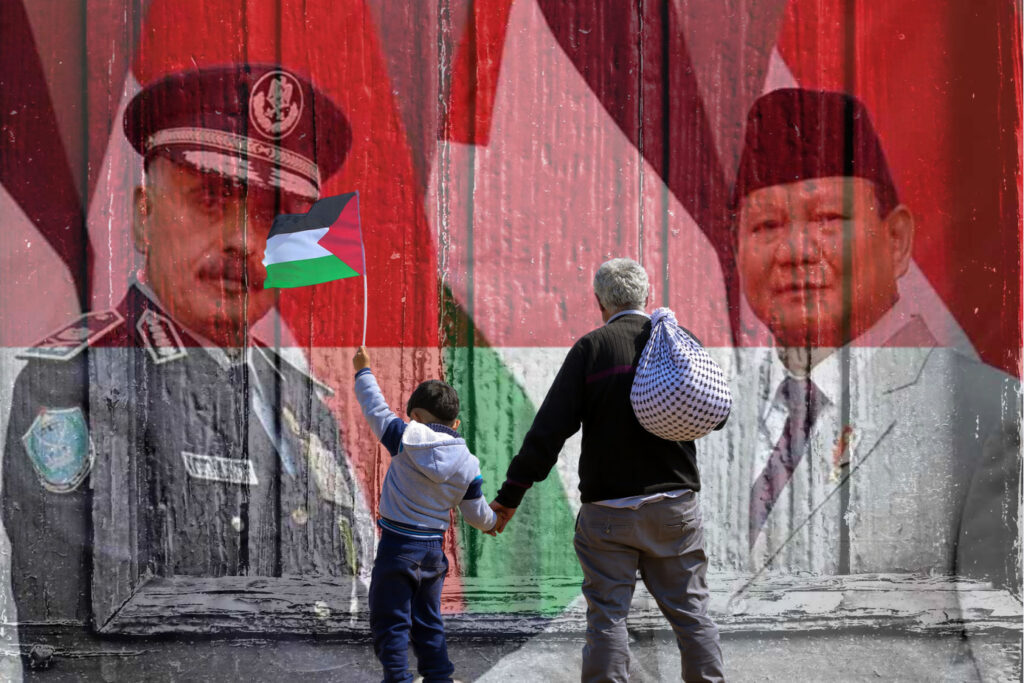Dignified Diplomacy: A Middle Path for Humanity

The plan to evacuate one thousand Palestinian civilians from the Gaza Strip by the Indonesian government, under the leadership of President Prabowo Subianto, is clear evidence that Indonesia not only stands on the side of humanity but also plays an active and dignified role in the global geopolitical arena. This is not just about rescuing war victims, but also about building Indonesia’s reputation as a great nation—with conscience and leadership that is heard. President Prabowo did not act alone; he directly consulted with five key countries in the Middle East—United Arab Emirates, Turkey, Egypt, Qatar, and Jordan.
This consultative diplomatic approach signifies Indonesia’s seriousness in maintaining neutrality, international trust, and commitment to regional stability. Amid a world that is increasingly polarized, Indonesia chooses a peaceful, inclusive, and collaborative path. As the country with the largest Muslim population and an active member of the Non-Aligned Movement, Indonesia holds a unique geopolitical position.
When the international community called for Indonesia to be more vocal regarding the Gaza crisis, the government responded with concrete actions that integrate both morality and strategy. Indonesia did not come with political claims but with genuine humanitarian aid and firm principles: supporting the Palestinian people.
It is also commendable that the government firmly rejects any form of permanent relocation. This evacuation is temporary, focusing on war victims in need of medical care and psychosocial recovery. This humanitarian step is aligned with international law and, at the same time, prevents any form of political manipulation concerning vulnerable refugee issues.
Indonesia’s approach is also very cautious. The goal is clear: to ensure that this goodwill does not weaken Palestine’s struggle or permanently alter Gaza’s demographics. Here lies Indonesia’s diplomatic strength—not sensational, but substantial; not reactive, but strategically calculated.
In this regard, Indonesia positions itself as a bridge of trust amid global actors who often get trapped in unilateral interest politics. This humanitarian evacuation, while seemingly simple, becomes a key instrument in reaffirming Indonesia’s position in the eyes of the world: as a country capable of integrating foreign policy based on humanitarian principles, international law, and multilateral consensus.
Meanwhile, the world also observes a different dynamic from within Israel. Around 1,000 reserve soldiers, including important figures such as former military commander Dan Halutz, openly express their disagreement with Prime Minister Benjamin Netanyahu’s military approach. They advocate for peaceful negotiations to release hostages, not escalating violence that only worsens civilian suffering.
Sharp criticism of Netanyahu—who is accused of using the war for personal political gain—shows a serious fragmentation between political and military elites. This situation reflects a crisis of morality and legitimacy within a country that has relied on a power-based approach to conflict resolution. When voices from within the military itself call for an end to operations and a diplomatic solution, it becomes clear that coercive approaches are losing legitimacy.
Amid this moral chaos and coercive policies, Indonesia emerges as a clear voice. A country that not only talks about peace but also acts. A country that does not play with power, but emphasizes humanity as the foundation of its foreign policy. Indonesia understands that the Israel-Palestine conflict is not just a battle between two political forces, but a humanitarian tragedy requiring global leadership that is empathetic and consistent with moral principles.
Thus, the evacuation of Palestinian civilians is not just a humanitarian act but also a geopolitical statement. It demonstrates that Indonesia wants, can, and is ready to be an important player in building a fairer, more peaceful, and humane world. While major countries are caught up in short-term interest calculations, Indonesia presents a long-term approach based on trust, morality, and adherence to international norms.
President Prabowo’s leadership in this matter reflects a new chapter in Indonesian diplomacy—a proactive, confident diplomacy grounded in humanitarian values. With a commitment to international law principles and global cooperation, Indonesia is now not only seen as a strategic partner but also as a driver of global morality.
What Indonesia is doing may become a new model for global diplomacy: humanitarian, inclusive, and collaborative. In a world filled with conflict and narrow interests, the presence of a country like Indonesia becomes crucial. A country that shows that true diplomatic power lies not in weapons or economic pressure, but in the courage to act based on universal moral principles.
In the future, global challenges will become even more complex—from managing conflicts to humanitarian tragedies. Indonesia, through concrete and principled steps in Gaza, has shown that such a path is still possible.
Dignified diplomacy, siding with victims, and upholding humanity is the only way to build fair and sustainable peace. Perhaps now is the time for the world to listen more deeply to what Indonesia advocates—not with weapons, but with morality and diplomacy. Not with coercive power, but with steadfast resolve. Because in dignified diplomacy, we find hope for a more peaceful world.
Prof. Dr. Ermaya Suradinata, SH, MH, MS, was the Governor of Lemhannas RI (2001-2005) and Director General of Social Politics at the Ministry of Home Affairs of the Republic of Indonesia (1998-2000). He is currently the Chairman of the Advisory Board of the Center for Geopolitics & Geostrategy Studies Indonesia (CGSI).
